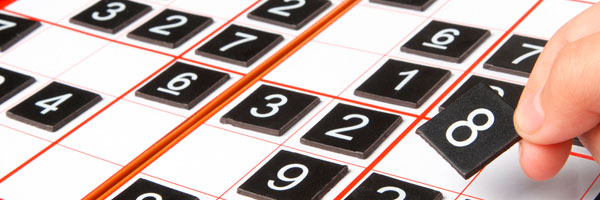The History of Sudoku

The history of Sudoku dates back to an 18th Century Swiss mathematician’s game called “Latin Squares” (according to this article from the Economist) and some of the first number puzzles to appear in newspapers were published in France in 1895. But the modern game of Sudoku as we recognize it today was invented by Howard Garns, a freelance puzzle inventor from Connersville, Indiana, USA in 1979 when it was published in Dell Pencil Puzzles and Word Games magazine. The puzzle was known as “Number Place,” since it involved placing individual numbers into empty spots on a 9 x 9 grid.
The game first appeared in Japan in 1984 where it was given the name “Sudoku,” which is short for a longer expression in Japanese – “Sūji wa dokushin ni kagiru” – which means, “the digits are limited to one occurrence.” Sudoku continues to be highly popular in Japan, where people buy over 600,000 Sudoku magazines per month.
One reason that Sudoku puzzles are so beloved in Japan is because the Japanese language doesn’t work very well for crossword puzzles – so a number puzzle was much more successful in Japanese culture. Also, Japan tends to love puzzles, since it is a country where millions of people make lengthy commutes by train or bus, and they need to kill time while waiting for the next stop.
The man who reintroduced Sudoku “back” to the Western world was a New Zealand judge named Wayne Gould, who was on vacation in Tokyo in March 1997 when he discovered Sudoku in a bookstore. He quickly became a devoted enthusiast of Sudoku and spent the next six years developing a computer program that could generate Sudoku puzzles.
The Times of London began publishing Sudoku puzzles in 2004, and the first U.S. newspaper to feature Sudoku was The Conway (New Hampshire) Daily Sun in 2004. Within the past 10 years, Sudoku has become a global phenomenon. The first World Sudoku Championship was hosted in Italy in 2006 and the 2013 World Sudoku Championship will be held in Beijing.
Why does Sudoku speak to us in today’s fast-paced world? One possible reason is that it appeals to people’s innate sense of order; there is something very satisfying about filling out those empty squares on the Sudoku grid. Another reason is that the rules are simple and easy to learn – people of all ages can play Sudoku and can often learn quickly how to approach the puzzle. As Sudoku’s global popularity attests, the game is easy to share with friends all over the world, because it is numbers-based and so it does not require any translation.
As long as people love to test their brains with the fun and challenge of logic puzzles, Sudoku will be a popular and beloved part of millions of people’s everyday lives around the world.